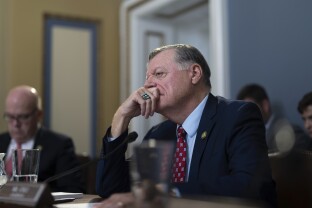Republicans are already staring down the possibility of a politically disastrous government shutdown, with funding set to run out on March 14 and lawmakers seeing little reason for any optimism.
“The clock is ticking and running away from us right now,” senior appropriator Rep. Steve Womack told NOTUS on Thursday.
The March 14 deadline, House Appropriations Chair Tom Cole told NOTUS this week, is “getting here faster than I would like.”
“We’re working as hard as we can. We’re negotiating in good faith,” he said. “I think our Democratic and Republican counterparts are doing the same thing. We’re just not there yet.”
Cole said top appropriators in both chambers are currently haggling over a topline spending number for the rest of the current fiscal year, which is already over four months overdue. The goal of these talks is to resolve a $90 billion discrepancy between the House and Senate’s committee-approved appropriations bills and to come up with, as Cole put it, a “magic topline.”
But with Republicans and Democrats still so far apart, that topline is looking more magical and far-fetched by the day. And, as Cole said, once they get that topline, it could still take an additional month to work through the “disputes over everything from riders to policy pronouncements.”
“So we need to get a topline,” Cole said. “Quick.”
With so much work still yet to be done, Republicans are starting to see a shutdown on their watch as a real possibility — particularly when President Donald Trump pushes the bounds of the law with executive orders and Democrats may try to reestablish the power of the purse by insisting on new riders.
Asked what he thought about the appropriations process, Rep. Mike Flood told NOTUS he felt “about the same as I feel every time.”
“Dreading it,” he said.
But there’s also an awkward reality that the Senate’s spending bills, which were passed out of committee under Democratic leadership, could undermine deliberations.
Under a Republican trifecta, lawmakers are keen to pursue more aggressive cuts. Further complicating matters, House GOP leadership has repeatedly floated tacking a debt ceiling increase to the March 14 spending bill.
“This should have been done in December,” Cole said.
“I didn’t get the authority to negotiate the topline until January,” he added. “By that time, I had a new Senate, a new president of the United States on the way. So we’re doing the best we can with the cards we have and the players we have around the table.”
Given the bipartisan, bicameral poker game that Cole described, the most obvious path to avert a government shutdown would be to pass another short-term continuing resolution. When pressed on potential permutations of a deal, and how Democrats fit into the equation, Cole acknowledged that a CR could be in the cards, though he was clear that’s not his preference.
Rep. Chuck Edwards, a member of the Appropriations Committee, was blunter. He told NOTUS he sees a CR as all but inevitable at this point.
“I don’t see any other option right now,” he said.
Another appropriator, Rep. Juan Ciscomani, described his growing suspicion that the conference will pursue a CR, though he hadn’t heard any official directive from leadership on that.
“If you would have asked me weeks ago, I would have said, ‘We’re going to absolutely meet this deadline,’” Ciscomani told NOTUS. “That’s still what we’re shooting for. I haven’t heard anything different from our leadership on it, but we can’t ignore the looming deadline.”
Passing a CR before March 14 could present its own challenges to GOP leaders. Just getting a three-month CR through the House before the holidays turned into a Herculean task for Speaker Mike Johnson, and it could inspire the wrath of conservatives who already seem tired of him.
Complicating matters even more is that Republicans are butting up against an April 30 deadline, set in the 2023 Fiscal Responsibility Act, which requires all 12 appropriations bills to advance individually or a 1% across-the-board spending cut takes effect.
“We trigger a sequester on April 30 if we don’t have our work done, and if maybe some of those colleagues think that’s a good thing, I don’t know,” Womack said. “I personally don’t think so.”
While appropriators like Womack are loath to suffer a cut like that, plenty of conservatives — consumed in the anti-Washington spending fervor that’s taken hold of Washington and the White House — would likely welcome a cut. In that sense, they have every incentive to hold up the process.
Meanwhile, the lawmakers working on a deal — only united in their desire to avoid that kind of sequester — aren’t aligned on even the contours of a solution.
Senior appropriator Rep. Ryan Zinke, for example, predicted to NOTUS that funds for border security and disaster relief in California and North Carolina would be attached to any March 14 spending bill. (Two other GOP members on the panel told NOTUS they’d heard nothing about that idea.)
“Perhaps that bill is going to have a baby and that baby’s name is ‘border,’” Zinke said.
But if appropriators aren’t on the same page, the rest of the GOP conference isn’t likely to be in the same library.
Any short-term CR is likely to find dozens of conservatives in opposition, meaning Republicans would have to replace those votes with Democrats — and Democrats are already signaling that they’ll seek concessions in exchange for any help on the floor.
Cole is prepared to call Democrats’ bluff, telling NOTUS that, “institutionally,” Democrats believe in government. He thinks enough Democrats would ultimately vote to keep the government open.
Still, that doesn’t mean a shutdown is out of the question. It just means there’s plenty of ways this could go wrong.
As Cole said, “I worry more about stumbling into a shutdown than someone deliberately triggering one.”
—
Riley Rogerson is a reporter at NOTUS.
Reese Gorman, who is a reporter at NOTUS, contributed to this report.
